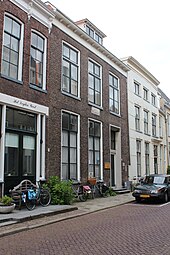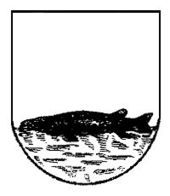Johan Rudolf Thorbecke
Johan Rudolf Thorbecke (born January 14, 1798 in Zwolle ; † June 4, 1872 in The Hague ) was a liberal Dutch politician and state theorist. Thorbecke is considered to be the founder of the parliamentary monarchy in the Netherlands and the country's most important statesman in the 19th century.
Scientific career

Thorbecke came from a Lutheran family in Zwolle. The Thorbecke family originally came from Osnabrück and had settled in Zwolle in the 17th century. His parents were the tobacco dealer Frederik Willem Thorbecke and Christina Regina Thorbecke.

Before going into politics, Thorbecke made a career as a scientist. Up to the age of 16 he attended the Latin school in Zwolle and in 1815 continued his high school education at the Atheneum Illustre in Amsterdam . He studied from October 1, 1817 Classics at the University of Leiden , where he on 23 June 1820 the theme Disputatio historico-critica inauguralis de C. Asinio Pollione to the doctor of philosophy doctorate . In 1820 he went on a study trip which took him to Göttingen , Marburg , Gießen , Heidelberg , Erlangen, Stuttgart, Munich, Jena, Dresden and Berlin. In October 1822 Thorbecke completed his habilitation as a lecturer in Gießen, in 1823 he worked as a lecturer at the University of Göttingen and published his historical-philosophical work on the essence and organic character of history here . Thorbecke remained an ardent admirer of Germany throughout his life and felt better understood there than in his Dutch homeland.
In 1824 he returned to his Dutch homeland, where in 1825 he published his first Dutch debut in Amsterdam, Bedenkingen aangaande het Regt en den Staat, eene beschouwing over de in 1823 uitgekomen Brieven over het Natuurregt anonymously. In 1825 he was appointed full professor of political science at the University of Ghent , which task he took up on October 4, 1825 with the inaugural lecture De disciplinarum historicopoliticarum argumento . The Belgian Revolution ended his teaching there in 1830 and he went to the University of Leiden . On March 14, 1831 he became an associate professor of law there. On June 14, 1831 he received an honorary doctorate in law from the Senate of the Leiden University. In 1833 he took over a full legal chair. In his lectures he dealt not only with the history of Dutch civil law, but also the diplomatic history of Europe and the political history of the Netherlands. In 1834 he had also given lectures on the history of Roman law and on the history of fundamental freedoms (called "basic values" by Thorbecke). On April 16, 1836 he became a member of the Royal Netherlands Academy of Sciences . In 1840/1841 he was also rector of the Alma Mater . On January 18, 1850, he resigned his teaching post in order to devote himself entirely to politics.
Political career
In 1840 Thorbecke was appointed to the Second Chamber of the States General and took the initiative for a radical constitutional reform, which he had already called for in his writings Aanteekening op de grondwet and Proeve van herziene grondwet . In 1845 he submitted the fully elaborated draft of a constitutional reform, but failed with 21 to 35 votes in parliament. In 1848, under the influence of the revolutionary unrest in large parts of Europe, he was commissioned by King Willem II to work out a complete revision of the Basic Law with a commission under his leadership . Central points of the constitutional reform were the exclusive responsibility of the ministers for the government - and thus the disempowerment of the king - and the strengthening of the Second Chamber of the States General with direct elections to parliament, but not with universal and equal suffrage until after the First World War . On November 3, 1848, this “peaceful revolution” came to a successful conclusion with its acceptance by parliament. King Willem II , who set up the Basic Law Commission and himself had massive influence on Conservative MPs, especially in the First Chamber , played an important role in this, so that the new constitution was adopted. According to his own statements, he had "changed from conservative to liberal within one night".
In the following years Thorbecke was three times chairman of the Council of Ministers and at the same time Minister of the Interior: 1849-1853, 1862-1866 and 1871-1872.
In 1866 he was awarded the honorary title of Minister of State .
Thorbecke is described as strict, harsh, even ruthless and got into arguments with Willem II and even more with Willem III. With Protestants he made himself unpopular with the admission of Catholic dioceses and even political companions broke with him. Nevertheless, he managed to fundamentally reform the Netherlands and transform it into a modern and liberal state. In contrast to the 17th century, the Netherlands were no longer a major power, but only a small state on the edge of Europe, but Thorbecke managed to instill new self-confidence in the Dutch: From then on they were proud to be the most tolerant country in Europe. In one of his last notes, shortly before his death, he wrote: As a small, bustling and not domineering people, we must and can be the freest people in the world in a monarchical-constitutional system. During his tenure in 1863, slavery was abolished in the Dutch West Indies.
Writings (a selection) and bibliography of his writings
- Commentatio de C. Asinii Pollionis vita et studiis doctrinae . Leiden 1820 (dissertation).
- About the essence and organic character of the story. A letter to Mr. Hofrath KF Eichhorn in Göttingen . Vandenhöck and Ruprecht, Göttingen 1824.
- Doubting aangaande het rain en the state. According to Mr. J. Kinker's briefing about the nature of nature . Pieter Meijer Warnars, Amsterdam 1825.
- Oratio de disciplinarum historico-politicarum argumento . Gent 1825 (inaugural lecture).
- Over het Bestuur van het onderwijs, in betrekking tot eene aanstaande Wetgeving . Willem Carel Wansleven, Zutphen 1829.
- Over de Erkentenis the onafhankelijkheid van België . Luchtmans, Leiden 1830.
- Aanteekening op de Grondwet . Johannes Müller, Amsterdam 1839. <fundamental to understanding Thorbecke>.
- Published collected:
- Thorbecke's smaller writings under the title Historische schetsen , Nijhoff, 's-Gravenhage 1860; 2nd edition Haag 1872.
- Thorbecke's speeches in the Tweede Kamer der Staten-Generaal under the title Parlementaire redevoeringen , Ter Gunne, Deventer 1856-1870 (6 volumes); Supplements under the title De onuitgegeven parlementaire redevoeringen van Mr. JR Thorbecke . JB Wolters, Groningen 1900-1910 (6 volumes); Register volume : Register op de parlementaire redevoeringen van Mr. JR Thorbecke , S. Gouda Quint, Arnhem 1912.
- Th. Ch. L. Wijnmalen: Mr. Johan Rudolph Thorbecke. Eene bibliography . In: Jaarboek van de Maatschappij der Nederlandse Letterkunde. 1875 ( online , Dutch).
literature
- Horst Lademacher : Karl Freiherr vom and zum Stein and Johan Rudolf Thorbecke - A comparative contribution to the effort to ensure political participation . In: Bert Becker, Horst Lademacher (ed.): Spirit and shape in historical change. Facets of German and European History 1789 - 1989. Festschrift for Siegfried Bahne . Waxmann, Münster 2000. ISBN 3-89325-849-3 . Pp. 39-48.
- Roelofke Maaike Benata: Waar Thorbecke in zijn Leidse Tijd woonde . In: Jaarboekje voor Geschiedenis en Oudheidkunde van Leiden en Omstreken. Nautilus, Leiden 1998, ( Online PDF ).
- Jan Drentje: Thorbecke, een filosoof in de Politiek . Boom, Amsterdam 2004. ISBN 90-5352-985-3 .
- Dirk Jaap Noordam: Thorbecke en de romantic Liefde . In: Jaarboekje voor Geschiedenis en Oudheidkunde van Leiden en Omstreken. Nautilus, Leiden 1998, ( Online PDF ).
- Elsa Rachel Oppenheim: THORBECKE (Johan Rudolph) . In: Petrus Johannes Blok , Philipp Christiaan Molhuysen (Ed.): Nieuw Nederlandsch Biografisch Woordenboek . Part 4. N. Israel, Amsterdam 1974, Sp. 1308–1328 (Dutch, knaw.nl / dbnl.org - first edition: AW Sijthoff, Leiden 1918, reprinted unchanged). .
- Abraham Jacob van der Aa : Biographical Woordenboek der Nederlanden. Verlag JJ van Brederode, Haarlem, 1878, Bijvoegsel (supplement), p. 444, ( online , Dutch).
- Johan Rudolf Thorbecke Politicus zonder frase. In: Jan Romein , Annie Romein-Verschoor : Erflaters van onze beschaving. Em. Querido's Uitgeverij, Amsterdam 1977 ( online , Dutch).
Individual evidence
- ↑ Christoph Driessen: History of the Netherlands. From sea power to trend land. Regensburg 2016, p. 154.
- ↑ Horst Lademacher: History of the Netherlands . Scientific Book Society, Darmstadt 1983. p. 228.
- ↑ Horst Lademacher: History of the Netherlands . Scientific Book Society, Darmstadt 1983. p. 277.
- ↑ a b Christoph Driessen: History of the Netherlands. From sea power to trend land. Regensburg 2016, p. 156.
Web links
- Some texts by Thorbecke (Dutch)
- Entry in the DBNL
- Entry in the KNAW
- Thorbecke in the parliamentary documentation center of the University of Leiden
- Thorbecke, Johan Rudolf. Hessian biography. (As of February 13, 2020). In: Landesgeschichtliches Informationssystem Hessen (LAGIS).
| personal data | |
|---|---|
| SURNAME | Thorbecke, Johan Rudolf |
| ALTERNATIVE NAMES | Thorbecke, Johan Rudolph |
| BRIEF DESCRIPTION | Dutch statesman |
| DATE OF BIRTH | January 14, 1798 |
| PLACE OF BIRTH | Zwolle |
| DATE OF DEATH | June 4, 1872 |
| Place of death | The hague |



